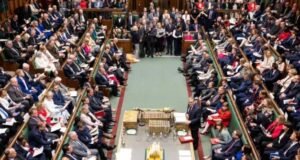Headteachers gather in central London to protest against shrinking education budgets
An estimated 2,000 headteachers and senior school leaders converged on Downing Street to deliver what organisers called an unprecedented protest at the damaging effects of shrinking budgets on their schools and colleges.
After a rally at Parliament Square, the headteachers marched down Whitehall to hand in a letter to Philip Hammond, the chancellor, explaining that their school budgets were in danger after seven years of austerity.
The march was organised through WorthLess?, a grassroots campaign for improved school funding started by Jules White, the headteacher of Tanbridge House secondary school in Horsham, West Sussex.
Organisers said the turnout was double what they anticipated, having originally expected 1,000 headteachers from England. But the grassroots campaign swelled to include school leaders from all regions of England, joined by colleagues from Wales and Northern Ireland.
“Headteachers are not normally the marching kind. So, when they do, it must be serious. They’re sick of being told that there’s more money in education than ever before, when what they see with their own eyes every day proves that it’s just not enough,” said Paul Whiteman, the general secretary of the National Association of Head Teachers (NAHT.
A survey by the NAHT found that nearly three-quarters of school leaders expect they will be unable to balance their budgets in the coming financial year. An earlier study found that 26% of maintained secondary schools in England ran a budget deficit in 2016-17, compared with less than 9% three years earlier.
According to the Institute for Fiscal Studies, total school spending per pupil in England has fallen around 8% in real terms between 2009-10 and 2017-18, once rising pupils numbers and cuts to sixth form and local authority funding are taken into account.
But the Department for Education argues that spending on schools is at record levels and will reach more than £43bn by 2020 – more per pupil than Germany or Japan.
“We know that we are asking schools to do more, which is why we are helping them to reduce the £10bn spent each year on non-staffing costs, providing government-backed deals for things like printers and energy suppliers that are helping to save millions of pounds,” a DfE spokesperson said.
Angela Rayner, Labour’s shadow education secretary, said: “This unprecedented action by headteachers is a clear sign of the desperate struggle they now face to provide a decent education while balancing the books.”
The letter delivered to Hammond urged the Treasury to reverse the real-terms spending cuts of recent years, and called for an extra £400m to support special education and high-needs pupils.
Ian Noon, of the National Deaf Children’s Society, said: “For children with special educational needs, like the UK’s 50,000 deaf children, a complete crisis is unfolding before our eyes.”
On social media, many school leaders regretted they weren’t able to join the rally. “I need to attend a meeting where the local authority will be informing us of a change to 2019-20 funding which will cost my school circa £180,000. The irony isn’t lost on any of us,” wrote Richard Johnson, a secondary school headteacher in Gloucestershire.
Whiteman said it was right for school leaders, governors and parents to use public protest to get their message across when the Treasury refused to budge.
“One teacher said to me recently that if we go to London on Friday and get the Treasury to change its funding policy, he reckons that will be the best day’s work he’s ever done. That’s the stage we’re at,” Whiteman said.
 Weekly Bangla Mirror | Bangla Mirror, Bangladeshi news in UK, bangla mirror news
Weekly Bangla Mirror | Bangla Mirror, Bangladeshi news in UK, bangla mirror news







